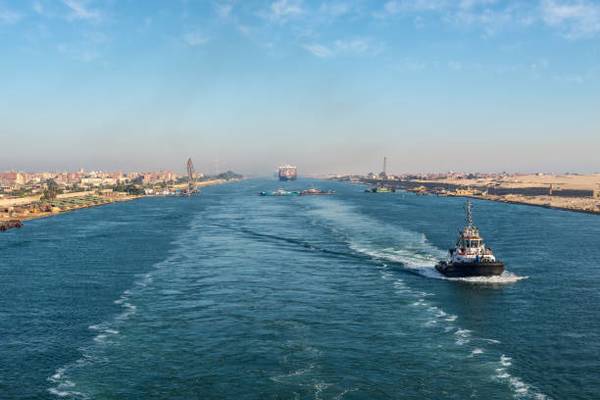Shipping disruptions upend supply chains, add costs and delays
Global supply chains are under pressure from simultaneous geopolitical and climate-related threats to shipping through the Red Sea, Black Sea and Panama Canal, with far-reaching implications for inflation, food and energy security, a new report from the United Nations notes.
 PHOTO: Cargo vessels transiting the Suez Canal. Getty Images
PHOTO: Cargo vessels transiting the Suez Canal. Getty Images
Attacks on commercial vessels in the Red Sea and drought in Panama have halved vessel transits through the Panama Canal and Suez Canal, two of the busiest international shipping chokepoints, the report from the United Nations Conference on Trade and Development (UNCTAD) notes.
Daily transits were reduced to just 24 in January by the Panama Canal Authority, which is significantly lower than the typical average of 35-36. Tonnage crossing the canal could be cut by roughly one-third in less than a year, according to a report by consultancy firm McKinsey, which adds that there could be nearly 4,000 fewer Panama Canal crossings as a result of the restrictions.
"This would represent an abrupt and significant change for supply chains," the report says.
In the Black Sea, the war in Ukraine has led to shifts in oil and grain trading routes and altered established patterns, UNCTAD notes.
Routes that typically go through the Suez Canal are facing the highest surge in rates due to the Houthi attacks on vessels in the Red Sea, as many operators are making longer journeys rounding the Cape of Good Hope. Freight rates on the Shanghai to North American East Coast have jumped from $3,900/ TEU in January to over $6,400 coming into February, according to UNCTAD data.
The effects of increased freight rates will be felt by consumers in the form of delayed deliveries, higher costs and inflation. The crisis may also have an impact on global food prices as long distances and disruptions may lead to increased costs and pose risks to global food security.
With vessels taking longer routes, they are also increasing their speeds to maintain schedules. This could lead to up to 70% increase in greenhouse gas emissions for a Singapore-Rotterdam round trip, UNCTAD says.
By Debarati Bhattacharjee
Please get in touch with comments or additional info to news@engine.online





